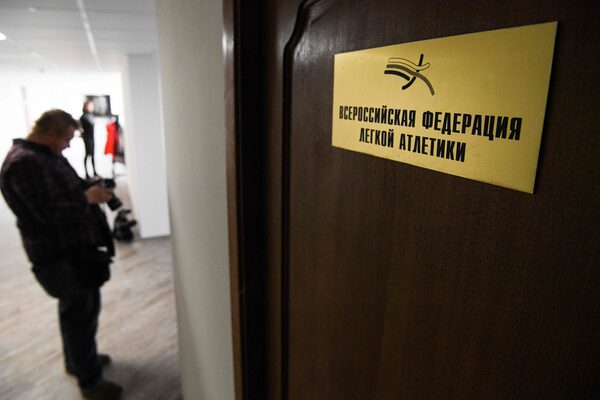
The Russian Athletics Federation has been suspended by the Russian governmentKIRILL KUDRYAVTSEV/AFP/Getty Images
The Russian government suspended its recognition of the national athletics federation for a month on Friday, increasing the pressure on officials to co-operate with investigations ahead of the Olympics, and said a banned coach allegedly returned.
The sports ministry’s suspension runs until March 1, two days after the federation is due to elect a new president to replace Dmitry Shlyakhtin.
Shlyakhtin resigned in November after he and six others were charged with filing false documents to give high jumper Danil Lysenko, the current world indoor champion, an alibi for being unavailable for a doping test.
Sports Minister Oleg Matytsin said the federation failed in its anti-doping duties and let relations with World Athletics deteriorate.
“A truly unprecedented decision has been taken, which in my view is the only right choice as of today,” Matytsin said. “I hope it will help to get [the federation] out of this crisis.”
The suspension is mostly a symbolic expression of disapproval, given that the ministry said it wouldn’t affect government backing for training camps and competitions. The ministry can decide to lift it at any time.
The Russian Athletics Federation denies any wrongdoing. The Athletics Integrity Unit, which investigates doping-related issues for World Athletics, said on Wednesday the federation had “gone to great lengths to deny any involvement in the matter, blame others and attack the process.”
It’s the latest in a string of doping-related matters involving the federation, which has been suspended by World Athletics since 2015 for widespread drug use.
A sports ministry document published on Friday said coach Viktor Chegin was sighted this month at a national team training camp in Sochi, citing information from the Russian anti-doping agency.
He’s serving a life ban for his role in a large-scale doping operation. More than 30 athletes from his training centre have been given doping bans, including Olympic and world champions.
It’s not the first time Russian coaches have been accused of flouting their bans. The Russian anti-doping agency said in 2018 Chegin was still working with athletes at a secret training camp in Kyrgyzstan.
World Athletics is already unhappy with Russia’s slow pace of reform, and in November froze a process allowing Russians to compete internationally as neutral athletes.
If that process doesn’t resume, Russia may not be able to field a track team at the Tokyo Olympics.
Russia’s top athletes have also lost patience with the federation leadership. Three-time world high-jump champion Mariya Lasitskene and others have been bitterly critical of officials who, they say, have wasted valuable time.
The case is separate from a wider legal battle between Russia and the World Anti-Doping Agency, which has ordered Russia’s name and flag to be barred from a range of major competitions, including the Olympics, for allegedly manipulating laboratory data.